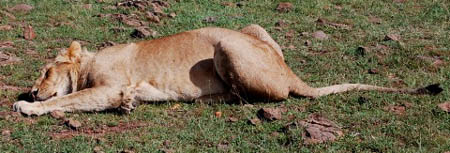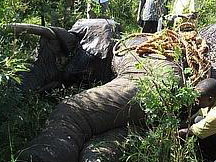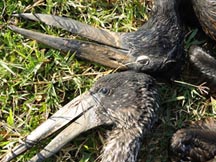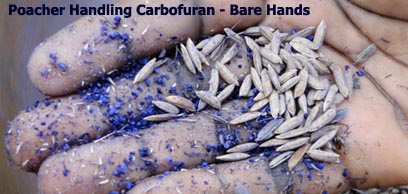|
.
SITE
MENU
|
Stop Wildlife Poisoning!

About Wildlife Poisoning
An exposé survey (http://stopwildlifepoisoning.wildlifedirect.org/furadan-in-kenya/) in 2007-2008 revealed that biodiversity poisoning in Kenya was a common practise flourishing in latency with the technique used to kill domestic vermin such as rats, livestock/human predators like lions, wild dogs, raptors and even crocodiles as well as dealing with intrusion such as migratory wildebeests on domestic livestock pasture and also exterminate rabid dogs. Besides it was found to be a technique for solving domestic disputes where the offended partner kills the unfaithful spouse!
Wildlife poisoning in Kenya however arises as a result of two major scenarios;
I.Human-wildlife conflict which targets the big cats, particularly lions and scavengers notably hyenas and vultures.
II. Cultural poaching of birds for human consumption.
Human-wildlife conflict is pronounced around Kenya’s wildlife reserves surrounded by pastoralist tribes. These include Masai Mara Game Reserve and Samburu & Buffalo Springs National Reserves where already localized conservation partners are engaged to conserve the predators.
These are Lion Guardians and Ewaso Lions initiative. The problem further extends into the neighborhoods of Amboseli National Park and Tsavo National parks reaching remote coastal Kenya.
Cultural poaching of birds thrives in major rice irrigation schemes in Bunyala Rice Irrigation Scheme, Mwea Rice Irrigation Scheme and Ahero Rice Irrigation Scheme having been efficiently boosted by Furadan, a nematicide and efficient killing Carbofuran pesticide which was only just withdrawn from East Africa in 2009. In these areas, poisoned fowls are for human consumption.
Wildlife poisoning is a major biodiversity problem beyond Kenya with deliberate poisonings of wildlife reported in other African countries like Uganda where the style of bird poaching similar to Kenya’s is known in some rice irrigation schemes; lion and other predator poisonings in Tanzania; vulture poisonings in Botswana and South Africa as well as broad spectral wildlife poisoning reported recently from Zimbabwe.
For further insight, read:
WildlifeDirect: Stop Wildlife Poisoning
Baraza/WildlifeDirect: Manufacturers of Furadan to pay $170 million
Birdlife International-News: Wildlife poisoning in Africa
BBC World News: Elephants die as poachers poison Zimbabwe waterholes
The Stop Wildlife Poisoning project carries out a nation-wide campaign to raise awareness of the discrete problem and the menace to human livelihood at large especially poisoning birds for human consumption with the aim of bringing to an end the harmful practice. The activities to be implemented by the campaign include maintaining a co-ordination office at WildlifeDirect in charge of a country-wide education initiative; mapping wildlife poisoning areas for yearly assessment of the campaign’s effectiveness based on annual wildlife poisoning incidences reported from the sites; setting up a central reporting system; capacity building of anti-poisoning partners at the grass root level in form of scouts training and recruitment; recently the campaign has gotten the Kenyan government’s attention and the project personnel are involved in the fact-finding missions and surveillance to sites known of poisoning from the project’s earlier surveys and background sources of the information.
By: Martin Odino, WildlifeDirect
|





